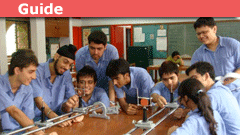Explaining the Life of a Physics Major
Full Chapter List - So You Want To Be A Physicist... Series
Part I: Early Physics Education in High schools
Part II: Surviving the First Year of College
Part III: Mathematical Preparations
Part IV: The Life of a Physics Major
Part V: Applying for Graduate School
Part VI: What to Expect from Graduate School Before You Get There
Part VII: The US Graduate School System
Part VIII: Alternative Careers for a Physics Grad
Part VIIIa: Entering Physics Graduate School From Another Major
Part IX: First years of Graduate School from Being a TA to the Graduate Exams
Part X: Choosing a Research area and an advisor
Part XI: Initiating Research Work
Part XII: Research work and The Lab Book
Part XIII: Publishing in a Physics Journal
Part XIV: Oral Presentations
Part XIII: Publishing in a Physics Journal (Addendum)
Part XIV: Oral Presentations – Addendum
Part XV – Writing Your Doctoral Thesis/Desertation
Part XVI – Your Thesis Defense
Part XVII – Getting a Job!
Part XVIII – Postdoctoral Position
Part XIX – Your Curriculum Vitae
So far, I have covered what I believe a student needs all the way to the end of the 2nd year of studies. In most schools in the US, an undergraduate must have a declared major by the end of the 2nd year (if not sooner). So by now, you should already be officially a physics major. Hopefully, by now, you would have made acquaintances with other physics majors and know who is in the same year group as you. This is important because chances are, you may want to find someone to discuss homework problems, etc. This is where having a local chapter of the Society of Physics Students (SPS) at your school can be useful. You get to meet other physics majors and also talk to the more senior students who can give you a better idea of what to expect (or which professor to avoid in certain classes). You should also keep in mind that there is a good chance that these are probably the same people who might continue on in this profession and that the friendship you are establishing might someday turn into a valuable point of contact in your professional career. Never underestimate the value of personal contacts.
The transition from the 2nd year into the 3rd year of college can mean smaller classes and more advanced subjects. This is where you start studying the ”meat” of a physics program – what I would call the 3 foundations of physics: classical mechanics, electromagnetic fields, and quantum mechanics. These are taught in separate courses, typically over 2 semesters each. Typical textbooks for each course are classical mechanics – Marion or Symon; E&M: Griffith, Reitz/Milford/Christy; QM: Griffith, Liboff. Now pay attention to this: ALL other physics subjects BUILD on the foundation laid by these three courses. The importance of these subjects cannot be overemphasized. In fact, if you are able to do it, you may even want to consider lowering your class load for 1 or 2 semesters while you’re taking one or more of these classes just so you can devote extra time to them. An E&M class, for example, can easily suck in a lot of time to understand and the homework problem can take a long time to finish. If you can afford it, do not hesitate to buy one of those books that have sample questions and worked out answers (Schaum and Rhea have a series of those). Now don’t cheat! Use them as guides and extra practice exercises to make sure you understand the material.
If you are in a school with a small student population, chances are that the faculty would already know you either by sight or by name. If not, this is where you have to start distinguishing yourself. Talk to your instructors if you do not understand something, that is why they have office hours. Introduce yourself so that they know your name. By the middle of your 3rd year, you should have enough physics knowledge that you might be somewhat useful to do some work. Ask around if there are any research projects or groups that you can work in, or find a professor that might be interested in giving you a simple project for you to work on. This is especially relevant in your 4th and final year where most schools have a senior research class available. Start attending your department’s weekly seminar/colloquium. Most of these may be way over your head, but they tend to cover a lot of research front areas of physics. You might also get some flavor if some of this research work is either done or of some interest, at your school. The point here is that you need to start distinguishing yourself slowly by this time. The faculty in your department should not just see you during class time.
Your contact with our academic adviser may depend on you and your needs. Most of the time, you only need to see him/her when you have to decide on what classes you need to take for the next academic term. But if you want to discuss with someone about your academic goals and what advanced level classes to take if you want to follow a certain path, he/she should also be someone you should consider. Make full use of the responsibility that they have been given. Now, in many schools, you are also given the freedom to choose your own academic adviser. Check with the policy of your department. If that is the case, you can certainly ask if a faculty member that you prefer can in fact become your undergraduate adviser. Again, this option may not be available in all schools, especially for smaller ones. Many undergraduates tend to stick to the person they were assigned to when they declared their major. The role of an academic adviser at this level isn’t as crucial under ordinary circumstances as to when you get into graduate school.
The next part of this essay applies only to US universities and to US citizens/permanent residents. If your school lacks the research work that is of any interest to you, or if you want additional experience over the summer holidays, then you may want to consider applying for the summer internship programs provided by the US Dept. of Energy. This provides an excellent opportunity for you to work at a world-renowned facility with practicing physicists. You may find the necessary information at the DOE website below:
http://www.scied.science.doe.gov/scied/sci_ed.htm
Keep in mind that competition for the internship is very intense. So, apply early!
In the next installment of this series, we address the final year of your undergraduate life, and the looming reality of either joining the rat race or continuing on to graduate school.
Next Chapter: Applying for Physics Graduate School
PhD Physics
Accelerator physics, photocathodes, field-enhancement. tunneling spectroscopy, superconductivity








Are opportunities for internship's year round or are they usually available only at the beginning of the school year?